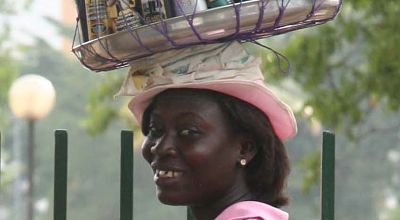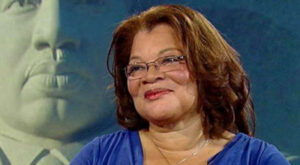It’s early morning and our five-member OM team is heading towards Aboabo—a society-forgotten part of Kumasi, a city with the largest market in Ghana.
If you spent half your day in a market like Kumasi’s, you wouldn’t be able to carry your heavy bags of rice and yam alone. Instead, you’d hire one of the kayaye to help carry everything while you shop. Put the load in a metal bowl and watch it rest on her head. She’s quiet, doesn’t complain, doesn’t ask how much money she can expect from you. You set the price.
Many in different parts of the globe use donkeys to carry their loads, but here there are people for that—people who are poor and don’t have many options.
It’s the kayaye we’re looking for this morning in Aboabo. They are not a tribe of people, but porters in the main cities of the country—mostly young girls from the north of Ghana.
After talking with them the day before, we found out where they stay. One girl described a room with 20 people sleeping in it—girls only, about $1 to $2 a week per person. We’re curious about what we’ll find.
This is their home: a muddy street winding along the edge of an old railroad, now occupied by hundreds of skinny feet walking in a long row to face another working day. I try to see the end of the line, but it doesn’t seem to end. I see their faces with tribal marks, cut during childhood. I think, What future could they have?
“I completed the third grade, but then we didn’t have money for school,” says one girl, Aisha, and looks down. “I want to go back to school, but I need money. That’s why I’m here.”
She says she’s 20, but I guess her to be no more than 17. I ask her if she wants to go back to the north, to Tamale, the town where she is from. She says yes, but at the same time she knows she won’t go back again.
Here there’s still hope for her—at least some dimly fading image of a brighter tomorrow. The money she gets from her job as a head-porter could lead her to the only tomorrow she might know.
She says men do not bother her at night—for now. Not all the kayaye have this privilege. In Accra, the capital of Ghana, they have to pay extra money to “protectors,” men who work as their bodyguards. If they don’t pay, they suffer rape.
I ask Aisha whether she has ever heard about Jesus. She claims to be a Muslim, shakes her head and asks us to tell her about Jesus. So we do, and we pray. We leave her tracts and take her phone number … but what now?
We decide to dive deeper into the Aboabo streets. Now we turn right and pass between wooden shacks so close together there’s only room for one person to pass at a time. After talking to some of the girls there, we peek into one of the little shacks. It’s a simple wooden room about five meters by three meters with no furniture, just rags on the floor and drying clothes above our heads. It seems like five people are sleeping. I don’t dare to ask where the toilet is and I wonder what will happen when the rainy season comes.
As we walk out of the shanty maze, my mind bursts with questions: What can we do? Where do we start and how? What would be effective and sustainable?
Kayaye faces stare at me when I close my eyes. And I can’t walk down a street in Kumasi without seeing them. I ponder about their lives and future. I know that God sees them too.
Lenka Slobodova, originally from Slovakia, is the coordinator of the Rural Child Aid Initiative (RCAI) of OM Ghana for the prevention and fight against human trafficking. She studied Applied Arts and Evangelical Theology and Missions. The opinions expressed in this article are solely those of the author.
See an error in this article?
To contact us or to submit an article


















